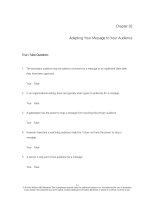Business communication building critical skill 6th module019
Bạn đang xem bản rút gọn của tài liệu. Xem và tải ngay bản đầy đủ của tài liệu tại đây (829.65 KB, 19 trang )
Planning,
Conducting,
and Recording
Meetings
Module Nineteen
McGraw-Hill/Irwin
Copyright © 2014 by The McGraw-Hill Companies, Inc. All rights reserved.
Learning Objectives
LO 19-1 Apply strategies for good meeting plans.
LO 19-2 Apply strategies for productive
meetings.
LO 19-3 Apply strategies for good meeting
decisions.
LO 19-4 Apply strategies for business
networking
19-2
Learning Objectives
LO 19-5 Explain techniques for effective meeting
participation.
LO 19-6 Select items for inclusion in meeting
minutes.
LO 19-7 Compose scripts for informal meetings
with bosses.
LO 19-8 Compare and contrast techniques for
virtual meetings versus face-to-face ones.
19-3
Types of Meetings
Parliamentary
Run under strict rules
Use Robert’s Rules of Order.
Staf
Typically are held to announce new policies and
products, answer questions, share ideas, and
motivate employees.
19-4
Types of Meetings
Team
Bring team members together to brainstorm,
solve problems, and create.
One-on-One
Are perhaps the most common kind of meeting
Highly informal
19-5
What planning should precede
a meeting?
Meetings can have at least six purposes:
To share information.
To brainstorm ideas.
To evaluate ideas.
To make decisions.
To create a document.
To motivate members.
19-6
What planning should precede
a meeting?
A good agenda indicates
The time and place of the meeting.
Whether each item is presented for information,
for discussion, or for a decision.
Who is sponsoring or introducing each item.
How much time is allotted for each item.
19-7
Sample Meeting Agenda
19-8
When I’m in charge, how do I keep the
meeting on track?
Help participants deal with issues in a timely
and thorough manner.
Make ground rules explicit.
Pay attention to people and the process at
hand.
If conflict gets out of hand, focus attention
on the group process.
19-9
What decision-making strategies
work well in meetings?
19-10
Networking
In your own organization, reach out to
people.
Go to lunch with co-workers.
Meet at least one additional person a week.
Seek out people in your department as well as
those beyond it.
19-11
Networking
Get to know people outside your
organization.
Join community organizations.
Take a course at a local college.
Join a professional society.
19-12
Networking
19-13
Dot Planning Allows Groups to Set
Priorities Quickly
19-14
How can I be an effective
meeting participant?
Prepare for meetings.
Speak when you have the chance.
Make notes so that you
can be succinct.
19-15
How can I be an effective
meeting participant?
While speaking
Show that you’ve done your homework.
Link your comment to that of someone in
power.
Find an ally ahead of time and agree to
acknowledge each other’s contributions at the
meeting.
19-16
What should go in meeting minutes?
Decisions reached.
Action items, where someone needs to
implement or follow up on something.
Open issues —issues raised but not
resolved.
Who was present, wording of motions and
amendments, and vote results.
19-17
How can I use informal meetings with
my boss to advance my career?
Plan 90-second scripts
that you can use to give
your boss a brief report
on what you’re doing,
ask for something you
need, or lay the
groundwork for an
important issue.
19-18
Do virtual meetings require special
consideration?
Be aware of the limitations of your channel
E-mail may seem more brusque
Audio meetings lack nonverbal cues
Videoconferences only show what the lens
picks up
Technology can fail
19-19









